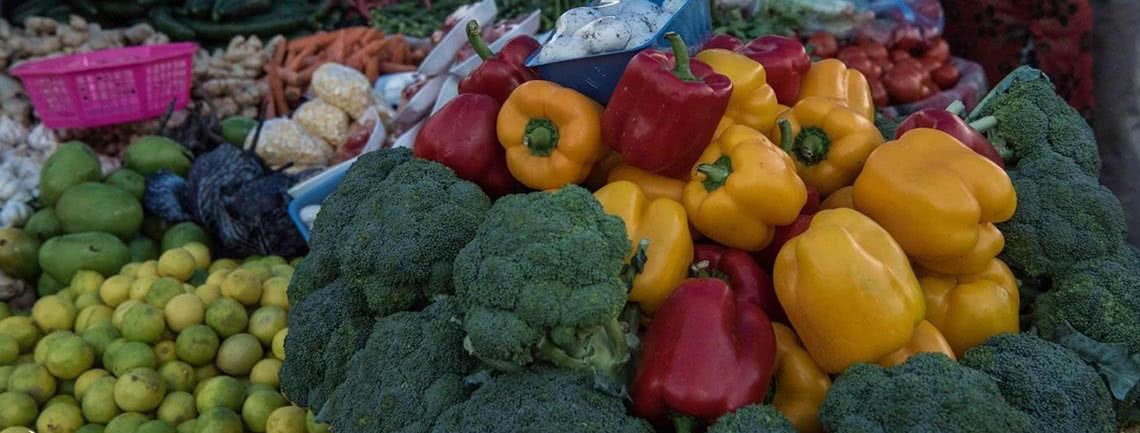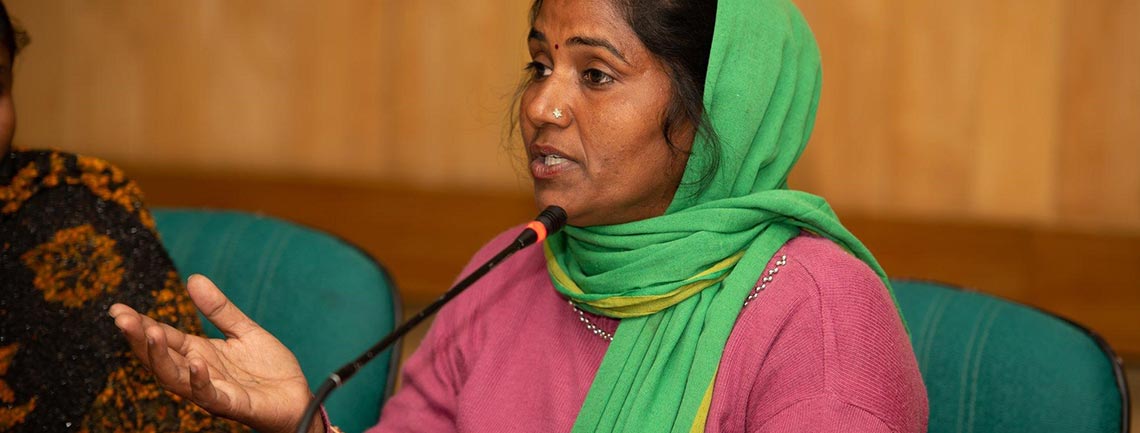Impact of COVID-19 on Street Vendors in India: Status and Steps for Advocacy
By: Avi Singh Majithia
July 2020

The lockdown in Delhi came down harshly on street vendors, as it did for many other workers in the city’s massive informal economy. Announced on 24th March with just 4 hours’ notice, an empty city meant that the city’s vendors immediately lost their source of income and were confronted with hunger and deprivation.
Some vendors (fruit and vegetable sellers) began venturing out after a few days without explicit permission, and immediately faced police harassment. After a few weeks, the government eased restrictions and essential vendors were being permitted to vend (due in large part to the advocacy of vendor organizations and activist networks). However, the cost of doing business, as well as the risk, has gone up significantly, with vendors not having access to wholesale markets and suppliers and having to spend more on travel costs due to travel restrictions in place in the city. Also, with the lockdown still partially in place, the number of buyers has gone down and so have earnings. Due to the harsh summer heat, perishable fruits and vegetables also have a reduced shelf life so vendors are unable to capitalise on whatever produce they do have.
The state has recently announced a stimulus package of INR 5000 crore for nearly 50 lakh vendors, acknowledging the grave impact of their loss of livelihood. The intended relief for vendors will be a credit loan that will provide an initial working capital of INR 10,000 for all vendors, but this is not sufficient. Instead of credit, the government should think of converting it into direct income benefit, a cash grant, as livelihood support to start the income activity in a regular way. The vendors need income support to be able to restart work, and if they are not able to do so, how will they return the loan. In the face of the ever-changing crisis, vendor organizations have to step forward and advocate for vendors to be provided the resources they need to be able to resume their livelihoods. To this end, vendors organizations could consider the following for an advocacy agenda:
- Livelihood promotion for all vendors, including those selling non-essential goods: The impact of COVID-19 has been very harsh on informal workers who have exhausted their capital and earnings in trying to feed themselves during the extended lockdown period. Vendors need to be able to resume vending for survival and the government should take steps to begin to reopen markets and allow vendors back on the streets.
- Reopening of Markets keeping in mind social distancing and hygiene: Delhi has many different types of traditionally crowded markets including weekly markets (for fresh food, cooked food and essential household items) and daily markets that operate on the sides of roads. These markets will need to resume keeping in mind the need for social distancing and the government should release guidelines for the same. Going forward, vending zones must also be designed keeping in mind the need for social distancing and for sufficient hygiene facilities (running water, washing stations and toilets). The authorities should work with Town Vending Committees (TVCs) for the same.
- Provide direct support which is de-linked from existing registration requirements: As lockdown is lifted and vending resumes, vendors who have been at home for months will need direct income benefits to resume their work. The government stimulus package, while a welcome step, is insufficient in the nature of relief (credit not direct cash transfer) and eligibility (only registered vendors are eligible, which leaves out the majority of vendors in the country). In addition, government relief and support needs to be de-linked from very rigid registration requirements, as very few vendors have been registered in India. In Delhi, out of roughly 300,000 street vendors, only about 131,00 have some form of occupational identification. If the criteria for any kind of cash grant or livelihood support is linked to occupational identification by the state, then the government should also accept registration with a workers’ organisation/union as a proxy for government-issued vending passes.
- Ensuring hygiene and social distancing at sites of vending: The government needs to take steps for provision of running water and soap/sanitisers for street vendors at their place of work. Additionally, vendor organisations should work with food safety authorities in the country to train vendors (especially cooked food vendors) in ways to maintain hygiene while working.
- Taking steps to survey and register more vendors for access to government benefits: As mentioned earlier, the number of vendors who have some form of identification are a fraction of the actual population of vendors in Delhi. Before the crisis and subsequent lockdown, the Town Vending Committees (TVCs) were supposed to start surveying and registering vendors. As we get used to the new normal, the process of survey and registration should also begin to ensure that all vendors are able to access social security benefits and financial aid during this period of crisis.
Rebuilding Lives in Resettlements: The Story of Savita Ben
Malavika Narayan
July 2020

In a room full of strangers, Savita ben starts to tell her story, her voice strong, her gaze sharp. Recalling her journey, her face clouds over remembering the difficulties she has faced. She recounts in a soft but determined manner, her experience of eviction and relocation to Savda Ghevra, almost ten years earlier. Her eyes mist over even today, at the harsh memories.
Her story is one of courage and of rebuilding her and her family’s life; it is a story of her hard work and perseverance in the face of many different challenges. It is a story of the city’s policies robbing her of her livelihood and exposing her to many insecurities and vulnerabilities. It is a story of her fortitude and commitment to make a better life for herself and her family.
Savita ben is a community organiser with the Mahila Housing Sewa Trust (MHT) in Savda Ghevra, a resettlement Colony in Delhi. An eloquent speaker with a soft voice and a determined manner, her story is one of hard work and perseverance in the face of many different challenges.
Born and brought up in a big family in Sultanpuri area of Delhi, she was married at the age of 16 and moved to Paharganj where she was a housewife, not knowing much about work and the outside world. With her husband and father-in-law working good jobs, the family was financially secure.
All of this suddenly changed when their colony was evicted in 2006 and the family was forced to move to Savda, a resettlement colony 40 km away from her home. A payment of Rs.7000 entitled them to a small plot of 12.5 square metres here, which had to be immediately occupied or it would be re-allocated. Savita ben vividly remembers the profound shock she felt when encountering this place.
“There was nothing here at all, just wide expanses of farm land and jungle for as far as we could see. The grass on our plot was as high as my shoulders, the land had not been serviced in any way. There were snakes and insects and I was so terrified all the time. My children were small and I was scared to put them down even for a minute.”
Starting over from zero was very difficult. The family began with nothing but two or three cots and a stone slab to keep their belongings and cook. Initially, there was no water at all and they had to carry water from as far as Ghevra village. There was also no provision for a toilet and they had to go outside.
With no reliable public transport and no nearby sources of livelihood, her father in law went back to Paharganj for work and continued to support them financially during this time. They only had enough savings to last them for a few months and so it was becoming crucial that they find some source of livelihood.
Eventually, she found out that there was work available on the nearby farms. Both Savita ben and her husband began to do this work, for which he earned Rs.100 and she earned Rs.80 for a full day of work. This was, however, very hard labour and it soon began to take a toll on her health. She has since worked various jobs, from construction worker to security guard, to hospital house-keeping and home-based work. Temporarily, she also worked in a nearby factory that made footwear (slippers). However, compulsory overtime and the long commute meant that there was no time to look after her children or do her domestic chores.
Amidst all this, Savita ben and her husband also slowly began to build their house. Like others in the colony, the change from kutcha to pucca has been a long-drawn out process over a period of ten years.
In 2008, MHT began work in the community and helped with micro-loans for the community to construct toilets and install water motors. They used to hold community meetings and she learned of them from her daughter. With their help, she was also able to get a loan to build a toilet and put in a water motor in her home.
Savita ben describes her engagement with MHT with great enthusiasm, especially about the many things women are made aware of during the organisations’ community meetings. Before this, women did not know about their rights from the state and who to approach for getting access to basic services. For the past nine months, she has been working as a part of the staff and is responsible for the holding of meetings in different blocks, listening to women’s problems and applications, and for keeping the work going smoothly in the community.
Despite having to navigate tensions at home, Savita ben is happy with her newer, confident self and is determined to continue her work. In spite of facing many challenges, like domestic conflict, the necessity to earn and put her children through higher education and marriage, and looking after the household, Savita ben is now confident that she can survive anything. Looking back at her journey from a shy housewife, to someone who confidently advocates for her community now, Savita ben considers her biggest achievement to be the ability to find work and demand to be paid appropriately for it. Her own contribution along with her husband’s in building their house and making ends meet is one she states with pride.
